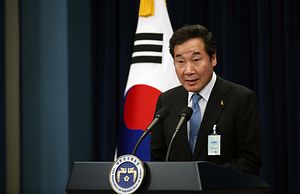Amid the escalating conflict between South Korea and Japan, South Korean politicians appear to have decided to take advantage of the situation by making hardline remarks toward Japan.
Cho Kuk, senior presidential secretary for civil affairs, became a controversial topic when he shared “Jukchangga,” or “Song for Bamboo Spears” in English, on his social media channel, for instance. Jukchangga is the work of the late poet Kim Nam-ju and is based on stories about medical soldiers who fought against Japan during the Donghak Peasants Movement in 1894.
Cho’s move was criticized as being appropriate given his position, especially at a time of deepening trade conflict between South Korea and Japan.
“Cho is basically instigating the people to raise bamboo sticks to attack Japan,” the conservative Bareunmirae Party said in a commentary. “It is frustrating to see that he is merely instigating people instead of coming forward to resolve the issue.”
Cho is not alone. Kim Hyun-chong, the second deputy chief of the presidential security office, also sparked controversy by saying South Korean people should mobilize to fight against Japan, citing the “National Debt Repayment Movement” in 1907. The campaign was designed to pay back 13 million South Korean won in loans provided by the Japanese Empire to keep the Korean economy dependent on Japan.
Anti-Japanese sentiment is a useful tool for Korean politicians to gain votes and push for their agenda. But they often seem to forget that there are always pros and cons. Politicians seem to be enjoying the current tension between South Korean and Japan, but it appears that business people in South Korea are not that entertained by it.
The Federation of Korean Industries (FKI) is going all-out to minimize the damage from strained relations.
On July 15, for instance, the FKI delivered a policy proposal to Japan’s Ministry of Economic and Industrial Affairs regarding Japan’s trade regulations. The FKI’s proposal calls for the withdrawal of the Japanese government’s restrictions on exports of materials used to manufacture semiconductors and display screens. The FKI also argued against measures to exclude South Korea from Japan’s “white list,” which provides streamlined approval process for exports for trusted partner countries.
“The ICT [Information Communication Technology] industry has a value chain among Japan, South Korea, the U.S., China and Europe,” the FKI said. “Japan’s move will have a negative impact on the trade chain of the global ICT industry.”
The FKI argued that Japanese firms in this chain will be negatively affected as well, urging the Japanese government to take this into consideration.
What is the South Korean government’s response? Some industry observers say that the government is looking at cards that it can play to resolve the situation, and one of them is the current Prime Minister Lee Nak-yon.
South Korean President Moon Jae-in stressed in early July Lee’s importance as a key diplomatic player. Many believe this as Moon’s attempt to provide more legitimacy to Lee so that he could be accepted by the international community, especially by Japan.
Lee is known as a Japan expert. He used to work as a Tokyo correspondent before he joined the political stage and once worked as chairman of Japan–Korea Parliamentarians’ Union.
Many local media outlets in South Korea also have suggested that it is time for Lee to take action.
“Japan’s upper house election, which Lee labelled ‘one of the obstacles for diplomatic cooperation with Japan’ is over,” Seoul-based weekly Sisa Week said.
Lee said in early July that it was not an ideal time for South Korea to talk to Japan as the election could have made politicians sensitive about what they do and say.
Since the election in Japan is over, however, it could be a good time for Lee to gear up for the normalization of relations with Japan, the weekly noted.
It might sound too much to rely on one person to sort out the entire work of normalization, but there are high – and growing – expectations placed on Lee from local political circles and media. That’s not only a comment on Lee himself, but an indication that there are not many other cards for South Korea to play.

































